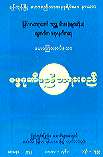
"SILA-MORALITY"
Nayaka Myittha Sayadaw,
VEN. U
VASAVA
Mahasi Meditation Centre, Yangon, Myanmar, 1999

|
"SILA-MORALITY" Nayaka Myittha Sayadaw, Mahasi Meditation Centre, Yangon, Myanmar, 1999 |
|
| Today, my dhamma talk is on Sila-Morality It is the virtue, a mode of mind and volition (cetana) manifested in speech or bodily action Also, it is the clearly conscious and intentional restraint from the bad deeds Person who possess virtuous morality can attain the following blessings
In fact, it is the foundation of the whole Buddhist practice in cleansing the kilesas or defilements for the realization of Nibbana Sila-morality may be classified into Buddhist laymen sila, Samanera or novices sila, Bhikkhu (monks) sila. Here, let us try and understand the Buddhist laymen sila which can be categorized into 5 precepts and 8 precepts. Basically one who observes the strict discipline of 5 precepts can be regarded as a noble person. One who possess virtuous morality or sila is highly esteemed not only by human society but also by heavenly beings of Deva world The five moral rules, also called Panca-sila, binding on all Buddhist laymen are -
These are the five precepts Those who observe the moral discipline of five precepts can attain human and celestial existences and finally the Nibbana. To verify this fact, let us scrutinize the life story of Panca-sila-Samadaniya Bhikkhu as an example. It was recorded in the Therapadanam Pali Text. i e. stanzas spoken by Enlightened Arahant. He was a poor man during the time of Anomadassi Buddha about one hundred thousand world cycles ago One day, he had an opportunity of listening to the admonishment of Ven. Nisabha Mahathera, the chief disciple of Buddha Anomadassi. Since then he became very pious and observed the strict discipline of Panca Sila - 5 precepts for the rest of his life. At that time, the longevity of human life was about one hundred thousand years. After the demise of that existence, he was bestowed with the luxurious lives of human and Deva worlds, thirty times as king of celestial beings and seventy five times universal sovereign of the human world, and countless number of ordinary human and Deva existences He has never been to nether worlds, 4 apaya worlds of animals, ghost, demon and hell. At the end of one hundred thousand world cycles and during the time of our Lord Gotama Buddha, he became the son of one rich family in Vesali city. One day he accompanied his parents to the Lord Buddha's residing monastery. The moment he heard his parents taking the precepts, he was overwhelmed by the ecstatic bliss following the awakening memory of his previous morality virtue, he practised one hundred thousand would cycles ago. Then he observed this Piti (rapture) as meditation object and contemplated all the physical and mental phenomena as they truly are. He attained the various stages of progressive insight in that sitting and realized Nibbana and became an Arahant. Being endowed with morality, concentration brings high fruit and blessing. Being endowed with concentration, wisdom brings high fruit and blessing. Being endowed with wisdom, the mind becomes free from all cankers (asava) and deliverance from all suffering So, may you all meditators be able to observe strict morality and develop concentration and wisdom and finally attain the eternal bliss of Nibbana. Sadhu! Sadhu! Sadhu! |